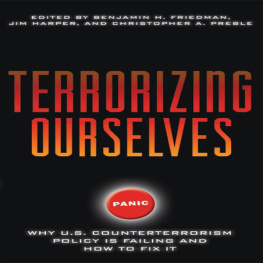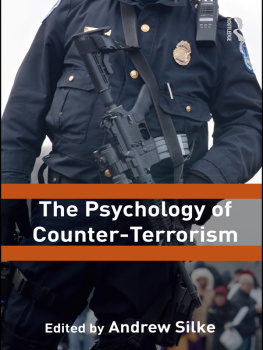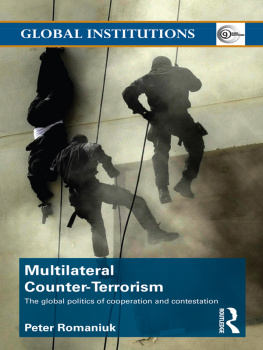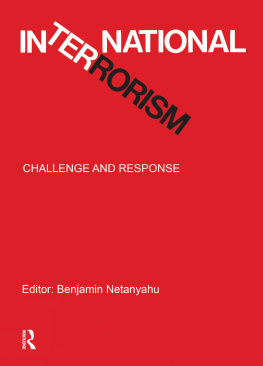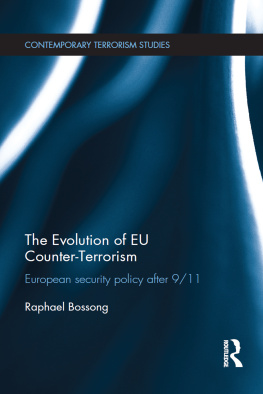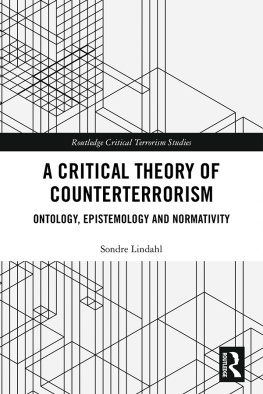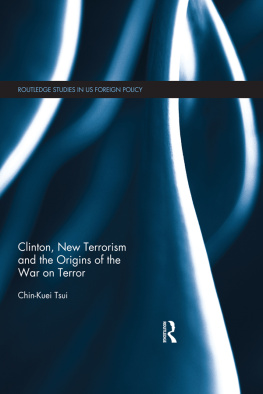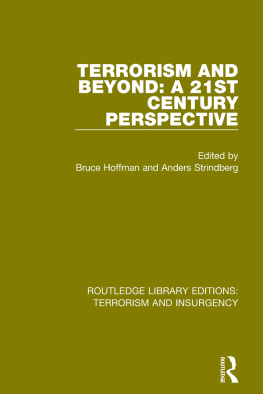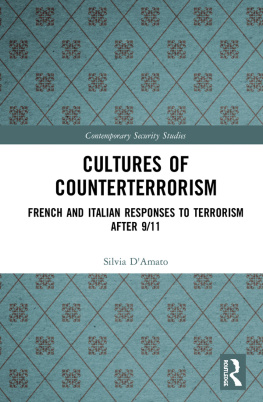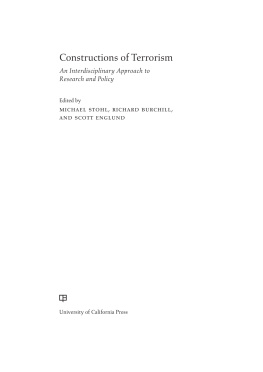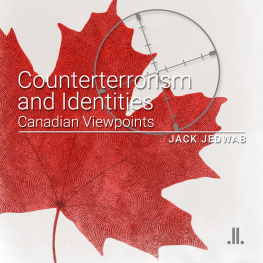Copyright 2010 by the Cato Institute.
All rights reserved.
Library of Congress Cataloging-in-Publication Data
Terrorizing ourselves : why U.S. counterterrorism policy is failing and how to fix it / edited by Benjamin H. Friedman, Jim Harper, and Christopher A. Preble.
p. cm.
Includes bibliographical references and index.
ISBN 978-1-935308-30-0 (hardback: alk. paper) 1. Terrorism United States. 2. TerrorismPreventionGovernment policyUnited States. 3. TerrorismUnited StatesPrevention. 4. National security United States. I. Friedman, Benjamin H. II. Harper, Jim, 1967 III. Preble, Christopher A.
HV6432.T4786 2010
363.325160973dc22
2010005480
Printed in the United States of America.
CATO INSTITUTE
1000 Massachusetts Ave., N.W.
Washington, D.C. 20001
www.cato.org
Acknowledgements
One might think that three coeditors could manage to assemble the chapters in this volume without much help. Far from it.
For starters, we are grateful to our contributors. We thank them for taking time out of their busy lives to write the chapters. We wish to express special thanks to Brandi Dunn, a tireless worker and perceptive critic who kept us on schedule, solved nettlesome problems, expressed her opinion, and otherwise made this entire project productive, rewarding, and ultimately fun.
The Cato Institute is more than just the publisher of this book. It is our intellectual home, a place that stimulates original thinking and allowed us to dedicate considerable time and effort to its completion. We want to thank Ed Crane, Bob Levy, William Niskanen, and David Boaz for their leadership. Cato vice president Gene Healy reviewed all of the chapters, offered timely feedback, and pressed us to live up to the highest ideals of sound scholarship and clear writing. The quality of the finished product is a testament to his tireless work. Charles Zakaib provided invaluable research assistance, as well as insightful comments, at various stages. We also appreciate the help of Peter Bandyk, Nicholas Brooke, Matt Fay, Jordan Gazit, and Adam Lamothe.
Others at Cato provided essential assistance. David Lampo kept us on track to meet our deadline. Robert Garber and Camille Cooke put together the marketing plan, and Jon Meyers designed the cover. Harrison Moar helped with media outreach. Copyeditors Joanne Platt and Ashley Young of Publications Professionals reviewed all chapters and played a particularly helpful role in reconciling the stylistic idiosyncracies that are inevitable in a work combining the contributions of 13 opinionated scholars. We are grateful to all of these individuals for their contribution to this project.
Finally, this book is just one of the tangible outputs produced as part of Catos strategic counterterrorism initiative, an ambitious three-year project made possible by the generous support of the Atlantic Philanthropies, with additional support from the Open Society Institute. The initiative develops and publicizes sophisticated, strategic responses to transnational terrorism and works to replace some of the flawed paradigms that bedevil current U.S. national security policies arising from terrorism. We want to thank both organizations for their support.
Benjamin H. Friedman
Jim Harper
Christopher A. Preble
January 2010
Introduction
Measured in lives and dollars, government reactions to terrorism often impose greater costs on the societies attacked than terror attacks themselves. Overreaction does the work of terrorism. Ignorance of this cardinal fact is why U.S. counterterrorism policy is failing.
As we approach nearly a decade of aggressive U.S. government action, the results that counterterrorism policy should seek still elude us. Americans are neither as secure as they should be, nor do they feel that their lives and liberties are well protected.
Instead, terrorism is very much with us. Though they pale in comparison to 9/11, new attacks, both successful and failed, remind us that terrorists seek ways to harm us. And the nations politics remain in thrall to the specter of terrorism. Rather than dispassionately addressing true threats, our national leaders often hype implausible threats and jockey for political advantage in anticipation of terrorist strikes.
This struggle to address terrorism exists for good reason: Policy-makers, the media, and the public lack a strategic understanding of terrorism. And they lack awareness of appropriate, strategic responses to it.
This book contains the dispassionate, analytical thinking about terrorism so needed if the United States is going to develop successful counterterrorism policies. It aims to foster new understanding and new approaches to terrorism that center on resisting overreaction. By addressing terrorism forthrightly and confidently, we can take control of our security, drain power from terrorism, and make it ineffective.
The first step in a conventional account of strategic counterterrorism is to understand its practitioners. Terrorists have motivations, there is a strategic logic to their actions, and examining these things can reveal strategies that frustrate and dissipate their efforts.
But we begin with a chapter highlighting the goal of counterterrorism. [T]he best way to formulate grand strategy, begins U.S. National War College professor of strategy Audrey Kurth Cronin in her chapter, Defeating al Qaeda, is to look beyond the war to the nature of the peace.
In many ways, terrorism draws power from the state, turning state power toward the accomplishment of terrorists aims. Aware of the gifts overreaction gives terrorists, Cronin illustrates how states can deny terrorism the oxygen and nutrients that sustain it. She explores the seven patterns by which terrorist groups meet their demise.
Of course, deepening our understanding of how terrorism arises will enable us to counter it earlier and better. James Forest, director of terrorism studies and associate professor at the United States Military Academy, investigates terrorisms roots in his chapter, Terrorism as a Product of Choices and Perceptions. Along with activities aimed at weakening terrorist groups and ameliorating the conditions that spawn or justify terrorism, Forest argues, strategic communication, public diplomacy, and counterideology are leading elements of a robust counterterrorism strategy.
Mia Bloom, associate professor at Penn States Schools of International Studies and Womens Studies and a fellow at Penn States International Center for the Study of Terrorism, similarly explores inchoate terrorism. In her chapter, Are There Root Causes for Terrorist Support? Revisiting the Debate on Poverty, Education, and Terrorism, Bloom takes a fresh look at old assumptions and at recent analyses of what may cause terrorism.
The links that analysts have sought between socioeconomic conditions, political grievances, and terrorism exist, though they may better be thought of as soil in which terrorism can grow. And Blooms chapter serves as a warning against overreliance on external conditions as causes of terrorism. [A] focus on external influences on behavior robs the individual of agency; specifically of choosing to engage in terrorism. From whatever background circumstances, many individuals may choose terrorism because they perceive it as a way to expand their influence and powersimilar, perhaps, to the way an arsonist thrills at watching the destructive fire he set. For others, overreaction advances articulated organizational goals imposing costs on the victim state, for example, or promoting the cause of a terrorist group to key audiences. Denying terrorists such gratification is a way to mute the attractiveness of terror tactics.

